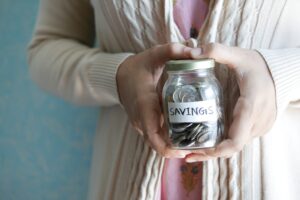Where to keep an emergency fund – it is a very common question that often gets asked. Most people have some idea of what an emergency fund is and why it’s important to have one. However, they might not know the best places to keep it.
Human life is full of uncertainties. But having an emergency fund helps you to have a financial cushion if the unexpected happens. So having an emergency fund is essential for everyone.
In this blog, we will be sharing everything you need to know about emergency funds. Including – what it is, its importance, and where to keep an emergency fund. So if you are planning to set up an emergency fund, then this article is for you!
What is an emergency fund?
Personal finance can be tricky to navigate, especially when unexpected expenses arise. That’s where having an emergency fund comes in handy!
An emergency fund is exactly what it sounds like – it’s a stash of money set aside specifically for unexpected expenses. Life can throw all sorts of curveballs at us. Whether it’s a medical emergency, a job loss, or a necessary home repair.
These kinds of unexpected events can be stressful and costly. But having an emergency fund accessible can give you peace of mind and financial security.
It’s important to keep your emergency fund accessible, so you can quickly access the money if you need it. A high-yield savings account is a good place to start. You’ll earn interest on your savings while still having easy access to your money.
In short, an emergency fund is a crucial aspect of personal finance that can provide financial security and peace of mind when unexpected expenses arise. Start building your emergency fund today so you can be prepared for whatever life throws your way!
The importance of having an emergency fund

Here are five key reasons why having an emergency fund is so important:
1. Unplanned expenses
Unplanned expenses are a fact of life, but you never know when they may arise. It could be a medical emergency, a car repair, or a leaky roof – anything that requires a large out-of-pocket expense.
Without an emergency fund, you would likely have to turn to credit cards or loans to cover these unexpected costs which can lead to accruing debt and high-interest rates. In contrast, having an emergency fund allows you to cover these expenses without having to worry about the financial repercussions.
It’s a safety net that can provide you peace of mind and the assurance that you are prepared for whatever life throws your way.
2. Job loss
Losing your job can be an incredibly stressful and difficult experience, especially if you don’t have any savings to fall back on. That’s where an emergency fund comes in. If you lose your job, your emergency fund can cover your living expenses for a period of time until you can find a new source of income.
This can relieve some of the financial stress and anxiety that comes with being unemployed. With an emergency fund in place, you can feel more secure and confident in your ability to navigate the challenges that come with sudden changes in your employment status.
3. Peace of mind
One of the biggest benefits of having an emergency fund is the peace of mind it can provide. Life is unpredictable, and the unexpected can be stressful and costly. However, having an emergency fund in place can give you a sense of security and help you feel better prepared for any curveballs that come your way.
You can rest easy knowing that you have a solid plan in place to handle these situations. Whether it’s a medical emergency, sudden job loss, or a necessary home repair, having an emergency fund can provide you with a sense of calm knowing that you are financially prepared for the unexpected.
4. Avoid debt
Without an emergency fund, you may find yourself relying on loans or credit cards to cover unexpected expenses. This can quickly lead to high-interest payments and mounting debt. By having an emergency fund, you can avoid this cycle of debt and maintain your financial stability.
Instead of relying on credit cards, you can use your emergency savings to cover unexpected costs and remain debt-free. This can also help you build your credit score, as you will be less likely to miss payments or accumulate high balances.
5. Financial independence
Building an emergency fund is a crucial step toward achieving financial independence. It provides a financial safety net for unexpected expenses, which can give you the freedom and confidence to pursue your goals and dreams without worrying about financial setbacks.
Additionally, having an emergency fund can help you get through temporary financial challenges without resorting to credit card debt. By avoiding high-interest loans or credit card balances, you can keep more of your money and put it towards achieving your long-term financial goals.
Simply put, an emergency fund is an essential component of financial independence that helps you stay in control of your finances and chart a course toward long-term success.
How much should you keep in your emergency savings account?
The general rule of thumb is to have three to six months of living expenses in your emergency fund.
This means you should add up all of your necessary monthly expenses, including rent/mortgage payments, utilities, groceries, and any other bills you have. Then, multiply that number by three or six, depending on your personal circumstances.
It’s important to note that the specific amount you need may depend on various factors, such as job stability, health status, and overall financial situation.
For example, if you have a steady job and good health insurance, you may only need three months’ worth of living expenses in your emergency fund, while someone with a less stable job and an irregular income or health condition may want to have six months’ worth saved up to be on the safe side.
Ultimately, the key is to have enough saved up so that you can cover a few months of expenses in case of an unexpected financial setback.
Top 6 places to keep your emergency fund

So now that we know one or two things about
1. Regular bank account
A regular bank account, like a checking account or traditional savings account, is the most common place to keep emergency funds. This option provides easy access to your money whenever you need it.
Set up an automatic transfer each month to ensure consistent growth. While savings accounts offer low interest rates, they remain a secure place to hold your funds in case of an emergency.
Remember to avoid using your emergency fund for non-emergencies to ensure you have enough in case of unexpected expenses.
2. Money market account
A money market account, often referred to as a money market mutual fund, is another option to consider for emergency saving storage. These accounts typically offer slightly higher interest rates than traditional savings accounts and provide the ability to write checks if necessary.
Additionally, most money market accounts are backed by the Federal Deposit Insurance Corporation (FDIC), which provides insurance coverage up to $250,000 per depositor, per account.
While money market accounts may have higher minimum balance requirements and fees than other options, they are generally considered safe and accessible option for emergency funds.
3. High-yield savings account
Another option to consider to keep your emergency funds is a high-yield savings account. These accounts, offered by online banks or credit unions, typically offer much higher interest rates than traditional savings accounts, which means that your money can grow faster over time.
With high-yield savings accounts, you still have easy access to your funds when you need them. Also, most high-yield savings accounts are FDIC-insured, meaning that your deposits are backed by the government by up to $250,000 per depositor, per account.
Keep in mind that some high-yield savings accounts may have minimum balance requirements or limited withdrawals per month.
4. Bank or credit union
Another option to consider for emergency fund storage is to keep your funds in a bank or credit union. Both of these options provide FDIC or NCUA insurance, which means your funds are secured and protected up to a certain amount.
Typically, credit unions and online banks offer higher interest rates than traditional brick-and-mortar banks, giving you the opportunity for your funds to generate more interest.
It’s important to research your options and compare fees and interest rates before selecting a bank or credit union to ensure that you receive the best possible benefits for your emergency fund.
5. Certificate of Deposit
Another option for storing your emergency fund is a certificate of deposit (CD). CDs typically require a minimum deposit and a fixed term, ranging from a couple of months to several years, but offer higher interest rates than traditional savings accounts.
The downside is that you cannot withdraw your funds before the term is up without incurring penalties. However, you can create a “ladder” of CDs that mature at different times for greater flexibility.
CDs are also FDIC-insured, making them a safe option for storing your emergency funds if you can afford to leave the funds untouched for the duration of the CD term.
6. Roath individual retirement account (IRA) or Roth 401(k)
One lesser-known option for storing your emergency funds is a Roth individual retirement account (IRA) or Roth 401(k). While these accounts are typically intended for retirement savings, they can also serve as emergency funds if necessary.
You can withdraw your contributions (not earnings) at any time without penalty or taxes, making it a flexible option for those who may need their emergency savings sooner than retirement age.
Roth IRAs and Roth 401(k)s are also tax-advantaged accounts, meaning that your contributions are made with after-tax dollars and will not be taxed when withdrawn in retirement.
Conclusion
When the question comes to where to keep an emergency fund, there is no one-size-fits-all answer. Depending on your individual needs and goals, you may find that one of the above options works better for you than another. The goal is to keep your funds in a liquid form so that you can access them when needed, while still allowing your money to work for you. So make sure to do your research and select the best option for you. Good luck!







